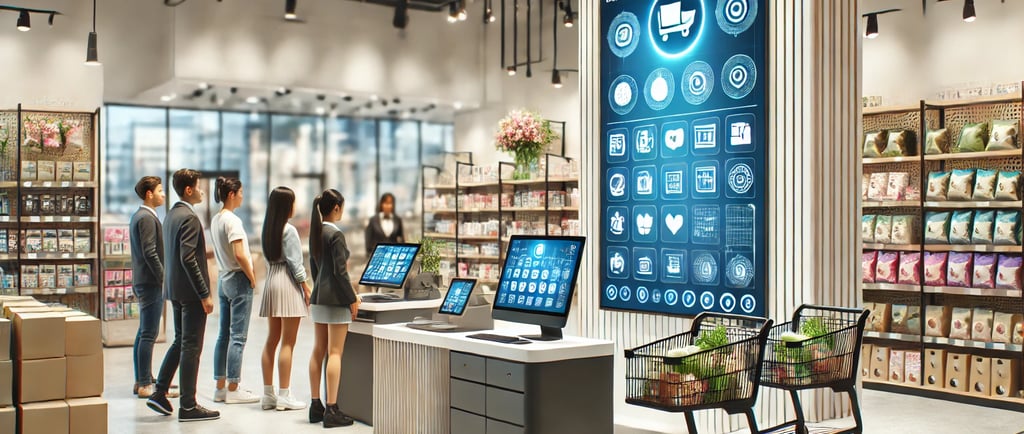The Role of IoT in Retail Technology: Transforming the Future of Shopping
Explore the role of IoT in retail technology is pivotal, boosting efficiency, enhancing customer experience, and optimizing supply chain management for a competitive edge.
RETAIL TECHNOLOGY


Introduction
The role of IoT in the modern retail landscape cannot be overstated. As retail technology evolves, the Internet of Things (IoT) has emerged as a pivotal innovation, driving efficiency, enhancing customer experience, and creating new opportunities for businesses to thrive in an increasingly competitive market. This article delves deep into the impact of IoT in retail technology, exploring its applications, benefits, and future potential.
Understanding the Role of IoT in Retail
What is IoT and How Does It Work?
The role of IoT in retail technology begins with a fundamental understanding of what IoT actually entails. IoT refers to a network of physical devices—such as sensors, cameras, and smart appliances—that are interconnected via the internet. These devices collect and share data, enabling real-time monitoring and control of various systems within a retail environment. The role of IoT is primarily about leveraging this interconnectedness to create smarter, more efficient operations and enhanced customer experiences.
Benefits of IoT for Retail Businesses
The role of IoT in retail technology brings numerous advantages to businesses. IoT enables real-time data collection, allowing retailers to make informed decisions quickly. For example, smart shelves equipped with sensors can notify store managers when stock levels are low, ensuring that products are always available for customers. Additionally, the IoT role includes enhancing the customer experience through personalized recommendations and streamlined shopping processes.
Challenges and Considerations in IoT Implementation
While the role of IoT in retail technology is transformative, it is not without challenges. Implementing IoT systems can be costly, requiring significant investment in hardware, software, and training. Moreover, it's role in retail technology also brings concerns around data security and privacy, as the vast amount of data generated by IoT devices needs to be protected from cyber threats.
IoT and Customer Experience
Personalized Shopping Experiences
One of the most impactful roles of IoT in retail technology is in the realm of customer experience. IoT allows retailers to gather detailed data on customer preferences and behaviors, enabling them to offer personalized shopping experiences. For instance, IoT-powered mobile apps can track a customer's shopping habits and provide tailored product recommendations, making the shopping experience more engaging and satisfying.
Enhanced In-Store Experiences
The role of IoT in retail technology extends to enhancing the in-store experience. Smart shelves, interactive displays, and beacon technology are just a few examples of how IoT is being used to create a more interactive and immersive shopping environment. Customers can receive real-time information about products, find items more easily, and enjoy a seamless checkout process, all thanks to the role of IoT in retail technology.
Omnichannel Customer Journeys
The role of IoT in retail technology is also crucial in creating a seamless omnichannel experience. IoT enables retailers to integrate their online and offline channels, providing a consistent and connected customer journey. For example, customers can use a mobile app to check stock availability before visiting a store, or they can place an online order and pick it up in-store. This interconnected approach enhances customer convenience and loyalty.
Improved Customer Service
In terms of customer service, the role of IoT in retail technology cannot be ignored. IoT devices can monitor store conditions, such as temperature and lighting, to ensure a comfortable shopping environment. Additionally, IoT-powered chatbots and virtual assistants can provide instant support to customers, answering questions and resolving issues in real time. This use of IoT in retail technology not only improves customer satisfaction but also frees up staff to focus on more complex tasks.
IoT and Supply Chain Optimization
Real-Time Visibility and Tracking
The role of IoT in retail technology plays a significant part in optimizing supply chain management. IoT devices provide real-time visibility into every stage of the supply chain, from production to delivery. This allows retailers to track shipments, monitor inventory levels, and respond quickly to any disruptions. The ability to have this level of insight is a game-changer in retail technology.
Inventory Management and Optimization
Effective inventory management is another critical area where the role of IoT in retail technology shines. IoT sensors and RFID tags provide accurate, real-time data on inventory levels, helping retailers maintain optimal stock levels. This not only reduces the risk of stockouts but also minimizes excess inventory, leading to cost savings and more efficient operations. The role of IoT in retail technology thus plays a key role in enhancing overall supply chain efficiency.
Predictive Maintenance and Asset Management
Predictive maintenance is yet another aspect where the role of IoT in retail technology is evident. IoT devices can monitor the condition of store equipment, such as refrigeration units or checkout systems, and predict when maintenance is needed. This prevents unexpected breakdowns and ensures that all systems are running smoothly, further optimizing the retail operation.
Supply Chain Resilience
The role of IoT in retail technology also contributes to supply chain resilience. By providing real-time data on supply chain operations, IoT helps retailers anticipate and respond to disruptions more effectively. For instance, if a supplier faces delays, IoT systems can automatically reroute orders or adjust inventory levels to minimize the impact on the store. This adaptability is a crucial benefit of IoT in retail technology.
Cost Reduction and Efficiency Gains
Finally, the role of IoT in retail technology contributes to cost reduction and efficiency gains throughout the supply chain. By automating routine tasks, optimizing inventory levels, and improving demand forecasting, IoT helps retailers operate more efficiently and reduce operational costs. These efficiency gains translate into a more profitable and competitive business.
IoT and Operational Efficiency
Smart Store Operations
The role of IoT in retail technology extends to the day-to-day operations of a retail store. Smart store operations leverage IoT devices to automate processes, such as lighting, heating, and security systems. These smart systems can adjust based on factors like foot traffic or time of day, reducing energy consumption and operational costs. This use of IoT in retail technology enhances the efficiency and sustainability of store operations.
Supply Chain Management
Supply chain management is another area where the role of IoT in retail technology is transformative. IoT devices enable real-time tracking and monitoring of goods as they move through the supply chain. This real-time data allows retailers to optimize logistics, reduce delivery times, and minimize errors. The role of IoT in retail technology here is crucial in ensuring that products are delivered to customers quickly and efficiently.
Inventory Management
The role of IoT in retail technology is particularly significant in inventory management. IoT sensors and RFID tags provide accurate, up-to-the-minute data on inventory levels, helping retailers avoid both overstocking and stockouts. This leads to better inventory turnover and reduced waste, which are essential for maintaining a profitable retail operation.
Pricing Optimization
Dynamic pricing is a strategy that benefits greatly from the role of IoT in retail technology. IoT devices can monitor competitor prices, customer demand, and market trends in real-time, allowing retailers to adjust prices accordingly. This flexibility ensures that prices remain competitive while maximizing profit margins, highlighting the strategic value of IoT in retail technology.
Demand Forecasting
Demand forecasting is another area where the role of IoT in retail technology proves invaluable. By analyzing data collected from IoT devices, retailers can accurately predict customer demand and adjust their inventory and pricing strategies accordingly. This ability to anticipate demand ensures that retailers can meet customer needs without overcommitting resources, further enhancing operational efficiency.
Future Trends in IoT for Retail
Artificial Intelligence and IoT
The future role of IoT in retail technology is closely tied to the integration of Artificial Intelligence (AI). AI algorithms can analyze the vast amounts of data generated by IoT devices, providing retailers with deeper insights into customer behavior and market trends. This combination of AI and IoT will enable more accurate demand forecasting, personalized marketing, and dynamic pricing strategies, further enhancing the effectiveness of retail technology.
Blockchain and IoT
Blockchain technology is another trend that will influence the role of IoT in retail technology. By creating secure, tamper-proof records of transactions and product movements, blockchain enhances the transparency and security of IoT networks. This is particularly important in the supply chain, where blockchain can help prevent fraud and ensure that products are authentic and of high quality.
IoT and Augmented Reality
Augmented Reality (AR) is set to play a significant role in retail technology, and when combined with IoT, the potential is enormous. IoT devices can collect data on customer preferences and behaviors, which can then be used to create personalized AR experiences. For example, customers could use AR apps to visualize how furniture would look in their homes or try on virtual clothing, all powered by IoT technology.
The Impact of 5G on IoT in Retail
The rollout of 5G networks will have a profound impact on the role of IoT in retail technology. With faster data transfer speeds, lower latency, and greater network capacity, 5G will enable more advanced IoT applications in retail. From real-time video analytics to interactive displays and immersive shopping experiences, 5G will significantly enhance the capabilities of IoT in retail technology.
Sustainability and IoT
Sustainability is becoming an increasingly important focus for retailers, and the role of IoT in retail technology is crucial in this area. IoT devices can monitor energy consumption, reduce waste, and optimize resource use, helping retailers to operate more sustainably. For example, IoT-enabled smart lighting and HVAC systems can adjust automatically to reduce energy consumption, while IoT sensors can track waste levels and optimize recycling processes.
IoT and Retail Security
Security is a critical concern in the retail industry, and the role of IoT in retail technology includes enhancing security measures. IoT devices such as smart cameras and access control systems can monitor store environments in real-time, detecting and responding to security threats. Additionally, IoT can be used to secure customer data and protect against cyber-attacks, ensuring that both physical and digital assets are safeguarded.
Customer Data and Privacy
As IoT devices collect vast amounts of customer data, privacy concerns are becoming increasingly important. The role of IoT in retail technology includes ensuring that customer data is collected, stored, and used in a way that complies with privacy regulations. Retailers must be transparent about their data practices and implement robust security measures to protect customer information. The role of IoT is not just about innovation but also about maintaining trust with customers.
The Future Retail Store: A Connected Ecosystem
The role of IoT in retail technology is ultimately about creating a connected ecosystem where every aspect of the retail operation is integrated and optimized. From smart shelves and personalized shopping experiences to real-time supply chain management and predictive maintenance, the future retail store will be a fully connected environment powered by IoT. This connected ecosystem will enable retailers to operate more efficiently, provide better customer experiences, and adapt quickly to changing market conditions.
Conclusion
The role of IoT in retail technology is transforming the industry in ways that were unimaginable just a few years ago. By enabling real-time data collection, personalized customer experiences, and optimized operations, IoT is helping retailers to stay competitive in a rapidly changing market. As IoT technology continues to evolve, its impact on retail technology will only grow, creating new opportunities and challenges for retailers around the world. For those who embrace the role of IoT, the future looks bright, with endless possibilities for innovation and growth.
